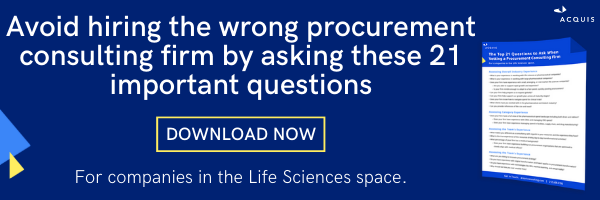Insight
5 Procurement Best Practices to Implement Post-COVID
In addition to the health concerns presented by COVID-19, the uncertainty surrounding the virus forced procurement leaders worldwide to consider potential blips in the supply chain that could drastically impact their organization.
Supply chain disruptions have brought much of the work of procurement leaders to the forefront. The Wall Street Journal reported on how many of these factors all came together at once this year and last to make for the mother of all supply chain disruptions:
The disruptions underscore how several forces are coming together to squeeze the world’s supply chains, from the pandemic-driven rise in consumer demand for tech goods to a backlog of imports at clogged California ports to U.S. factory outages caused by weather woes.
While many people are paying attention to these issues right now, procurement leaders understand that the focus needs to remain on these issues for the long term if they are to be solved.
In other words, they understand that they need to develop thoughtful and strategic responses that will enable them to keep things running smoothly, crisis or not. We want to look at some of those strategies and challenges today.
Prepare for Other Crises
Virtually no one saw COVID-19 as an imminent threat to the United States when early reports started to brew about a novel coronavirus in China.
In fact, most of the public had no clue what a coronavirus was prior to it reaching the shores of the United States. This simply illustrates the fact that a crisis can spring up from nearly anywhere, and the resulting damage that such a crisis can inflict on a business can be devastating.
For procurement teams in specific, having an action plan in place for these unforeseen crises is a must. Should another crisis occur, procurement teams can prepare in multiple ways, including:
- Organizing a zero-based category management strategy to justify every purchase, ultimately optimizing spend.
- Investing in digitization to streamline spend analysis and uncover areas of savings.
- Develop more vendor partnerships to help meet demand when supply diminishes and intelligently uncover sources of value.
Double-Down On Smart Procurement Processes
Now is no time to focus on trimming the procurement budget. There is a case to be made for trimming overhead out of any corporate budget, but wise management understands that they should avoid doing so at the cost of their procurement processes.
What the most successful firms are realizing at this time is the fact that disruption to supply chains has certainly caused economic pain and even some confusion for many brands, but it has opened up doors of opportunity to others. Cleo puts a spin on this that helps explain how certain firms are thriving in the current economic situation:
While most companies’ discretionary spending will be slowed due to the economic contraction, others will realize gains. For example, the global health crisis is also causing a massive shift to online buying. Those companies that were proactive and had the foresight to build e-commerce channels are doing well, and those that didn’t are struggling (to say the least).
The planners who prioritize smart procurement in potential shocks like the one we are living through right now will always have a leg up on those who assume that business will always carry on as usual.
Risk Management Takes Center Stage
Companies that established reliable relationships with suppliers long before COVID-19 struck were happy that they had done so when certain supply availability started to constrict.
They had a reliable track record that they could take to those suppliers to show that they would honor their agreements and purchase a certain amount of supplies at a certain time at a given price.
In addition to improving supplier relationships, procurement teams can prioritize risk management by:
- Utilizing predictive analytics and data to work through different scenarios and solutions.
- Identifying projected demand slumps and price fluctuations.
- Investing in technology that improves visibility into inherent and residual risks.
Data Collection: Worth Its Weight In Gold
Generalities about the supply chain can only get a company so far. It is helpful to have a picture of what is happening in the procurement process from anecdotal stories, but the cold hard data is what really drives accurate decision-making.
We are fortunate that many of the data tools necessary to make wise procurement decisions are readily available to anyone willing to purchase them. Whether you want to hire a reliable third-party company to set up a data collection program within your company or prefer keeping data in-house, it’s crucial to utilize the wealth of analytics available to you.
Once procurement teams understand the need to invest in data collection, they are able to leverage advanced analytics to convert these numbers into strategies that drive their procurement outlook.
Automation Thrives
Plenty of jobs that used to be done by human beings will fall into the hands of automation, that is a fact, but there are plenty of new job opportunities that will grow out of this changing reality as well.
Simply put, procurement automation makes sense. It does not mean that all human hands will be off the process, but it does mean that certain decisions can be made more rapidly and precisely.
Routine tasks and decisions in the field of procurement should be left to automation to free up time for the CPO and others working on procurement to take a look at the bigger challenges. These tasks include:
- Invoice and vendor management
- Contract approval
- Purchase order practices
The more time given back to the procurement team, the better they can prepare for attacking future challenges that others are not thinking about at this time.
Conclusion
Our team at Acquis Consulting has spent an incredible amount of time working with procurement leaders on developing sound strategies to overcome the challenges that they face. There is immeasurable pressure on procurement leaders such as yourself right now, so please feel free to contact us for the very latest on the implementation of successful procurement strategies both during and post-COVID.






